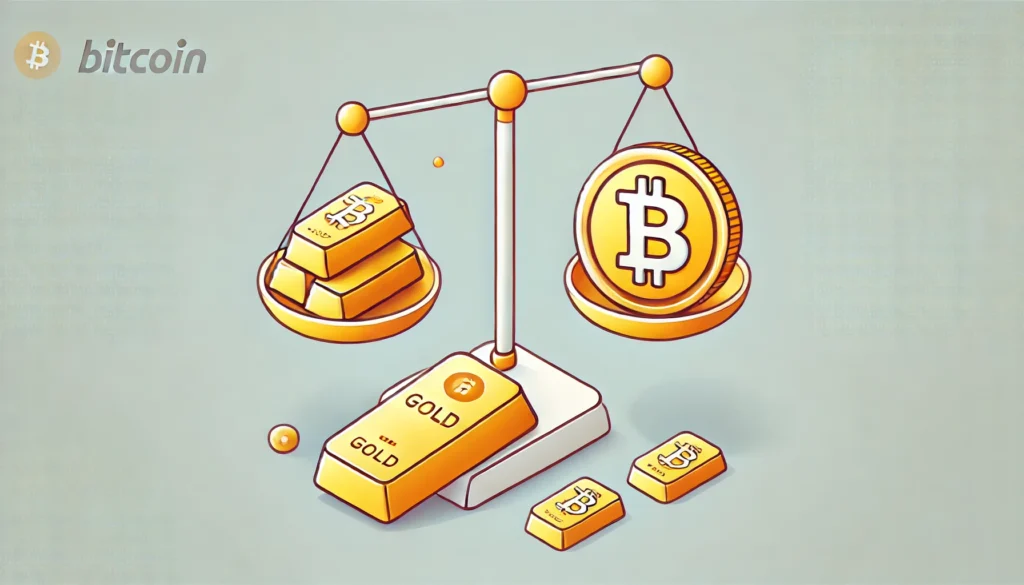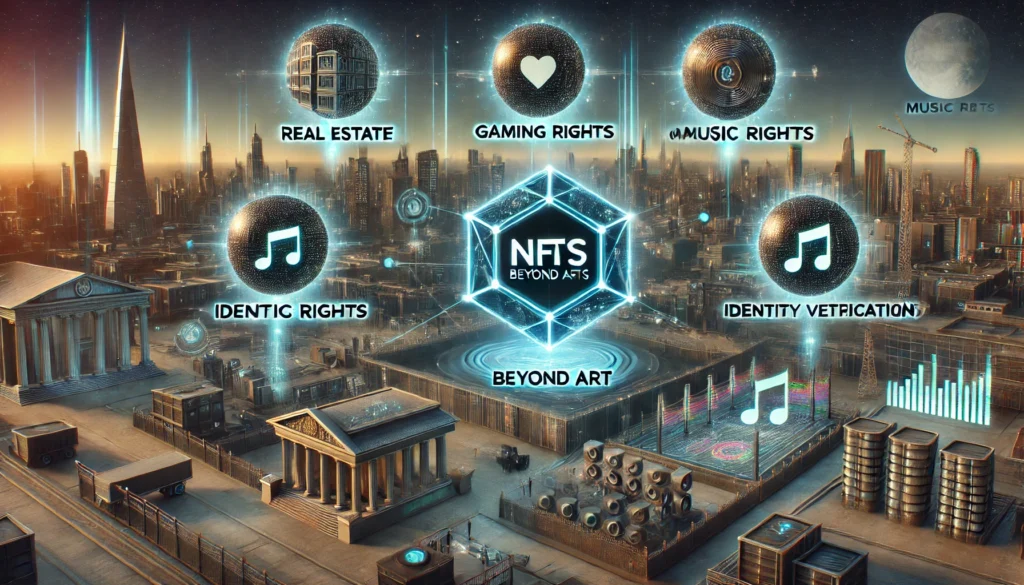The Future of Bitcoin: Will It Replace Gold as a Store of Value? For years, Bitcoin has been called “digital gold.” But can it truly replace gold as the ultimate store of value? That’s the big question on the minds of investors, economists, and crypto enthusiasts alike. Gold has been a trusted store of value for centuries, while Bitcoin is just over a decade old. Yet, Bitcoin’s rise in popularity has sparked debates about whether it could eventually take gold’s place. In this blog, we’ll explore what makes Bitcoin a contender for replacing gold, the key challenges it faces, and whether the future belongs to digital assets. Why Is Gold Considered a Store of Value? Gold has been a symbol of wealth for thousands of years. But what exactly makes it valuable? Scarcity: There’s a limited amount of gold on Earth, and mining it is costly and time-consuming. Durability: Unlike paper money, gold doesn’t corrode or degrade over time. Universal Acceptance: Gold is recognized and accepted globally as a form of wealth storage. Hedge Against Inflation: When fiat currencies lose value due to inflation, gold tends to hold its purchasing power. Because of these properties, investors have relied on gold as a safe haven during economic downturns and times of uncertainty. How Does Bitcoin Compare to Gold? Bitcoin shares some of gold’s most important characteristics, but with some added advantages: 1. Limited Supply Bitcoin’s total supply is capped at 21 million coins, making it even scarcer than gold. While new gold can still be mined, no new Bitcoin can be created beyond this limit, making it a deflationary asset. 2. Portability & Ease of Storage Gold is heavy, difficult to transport, and requires secure storage. Bitcoin, on the other hand, is purely digital. You can store millions of dollars worth of Bitcoin on a small hardware wallet or even in a memorized seed phrase. 3. Decentralization & Security Gold is stored in central vaults and controlled by institutions, whereas Bitcoin operates on a decentralized blockchain, making it resistant to government seizure and manipulation. 4. Accessibility & Divisibility Bitcoin is highly divisible (down to 0.00000001 BTC, called a satoshi), making it more practical for everyday transactions. Gold, while divisible, is not as easily transactable in small amounts. 5. Inflation Hedge Potential Gold has historically been a strong hedge against inflation. Bitcoin is still young, but its fixed supply suggests it could serve a similar purpose in the long run, especially as fiat currencies continue to lose value due to excessive money printing. The Case Against Bitcoin Replacing Gold Despite Bitcoin’s advantages, there are some major hurdles that prevent it from fully replacing gold—at least for now. 1. Volatility Bitcoin’s price swings are extreme. Gold, on the other hand, is relatively stable. Large investors and institutions may be hesitant to fully embrace Bitcoin as a store of value until its volatility decreases. 2. Regulatory Uncertainty Governments around the world are still figuring out how to regulate Bitcoin. Some countries have embraced it, while others have banned or restricted its use. Gold, on the other hand, has a well-established legal framework. 3. Energy Consumption & Environmental Concerns Bitcoin mining consumes a significant amount of energy. While gold mining also has environmental downsides, Bitcoin’s energy use remains a controversial topic. However, solutions like Bitcoin mining powered by renewable energy are emerging. 4. Lack of Historical Backing Gold has stood the test of time for thousands of years. Bitcoin has only been around since 2009. While its growth has been impressive, some investors are hesitant to bet on an asset that hasn’t yet faced multiple economic cycles over centuries. Could Bitcoin and Gold Coexist? Rather than Bitcoin outright replacing gold, many experts believe that both assets can coexist. Investors may choose to diversify their portfolios by holding both Bitcoin and gold. Each has its strengths—gold offers historical stability, while Bitcoin offers digital convenience and high potential growth. The Institutional Adoption Factor One of the biggest signs that Bitcoin is being taken seriously as a store of value is the increasing adoption by institutions. Companies like Tesla and MicroStrategy have invested billions in Bitcoin, and financial giants like Fidelity and BlackRock are offering Bitcoin investment options. If this trend continues, Bitcoin’s legitimacy as a store of value will only grow. Final Thoughts: Will Bitcoin Replace Gold? Bitcoin is an exciting and revolutionary asset, but it’s unlikely to completely replace gold anytime soon. Gold has centuries of trust and stability behind it, while Bitcoin is still proving itself. However, as technology evolves and financial systems shift toward digital assets, Bitcoin’s role as a store of value will likely continue to expand. Rather than an “either-or” scenario, we may be moving toward a future where both Bitcoin and gold play essential roles in wealth preservation. If Bitcoin matures and gains wider acceptance, it could become the digital alternative to gold that younger generations prefer. One thing is certain: the financial world is changing, and Bitcoin is at the forefront of that transformation. Whether you choose to invest in gold, Bitcoin, or both, understanding their strengths and weaknesses will help you make smarter financial decisions.
The Impact of Quantum Computing on Cryptocurrency Security Hey there, crypto fans! Let’s talk about something that’s both super cool and a bit scary: how quantum computing could change the game for our beloved cryptocurrencies. Imagine having a super-smart computer that can solve problems in seconds instead of years. That’s what quantum computing is all about. But what does it mean for our digital money? Let’s break it down in simple terms. Table of Contents What is Quantum Computing? Think of a regular computer as a person who can only do one thing at a time. Now, imagine a person who can do a million things at once. That’s a quantum computer. It uses something called “qubits” instead of the usual 0s and 1s. These qubits can be in many states at once, making quantum computers super powerful. They can solve problems that would take a normal computer forever. Why Should We Care? Cryptocurrencies like Bitcoin and Ethereum use special codes to keep your money safe. These codes are like locks that protect your digital wallet. But here’s the problem: quantum computers might be able to break these locks. Imagine someone being able to open your wallet and take your money just by using a super-smart computer. That’s why we need to pay attention. The Good News Don’t worry, though! Smart people are already working on solutions. They’re creating new codes that even quantum computers can’t break. These new codes are like super-strong locks that can keep your money safe. Some of these solutions include: Lattice-based cryptography: Imagine a complex maze that’s hard to navigate. This is like that. Hash-based signatures: Think of it as a unique fingerprint that’s hard to copy. Multivariate polynomial cryptography: It’s like a super-complicated math problem that’s nearly impossible to solve. What can you do ? While we wait for these new codes to become mainstream, here are a few tips to keep your money safe: Move to Quantum-Safe Cryptos: Look for cryptocurrencies that are already using quantum-resistant codes. Use Multisignature Wallets: These wallets need more than one key to open, adding an extra layer of security. Cold Storage: Keep your money offline, away from the internet, to protect it from hackers. Stay Updated: Regularly update your wallet software to protect against new threats. The Future is Exciting Quantum computing isn’t all bad news. It can also make our cryptocurrencies faster and more efficient. Imagine transactions happening in seconds instead of minutes. The key is to stay informed and adapt to the changes.So, crypto fans, let’s embrace the future with confidence. By staying ahead of the game, we can keep our digital money safe and secure.Stay tuned for more updates on how we can protect our crypto in the age of quantum computing! DeFi refers to a new wave of financial services built on blockchain, eliminating middlemen like banks. It allows people to borrow, lend, and trade crypto directly, often through smart contracts on platforms like Ethereum. NFTs are digital assets that represent ownership of unique items—like art, music, and virtual real estate. Unlike cryptocurrencies, NFTs aren’t interchangeable, making them valuable for digital creators and collectors. If you’re ready to step into the crypto world, you’ll need a secure wallet. One great option is Trust Wallet, which lets you store, buy, and trade crypto all in one place. Here’s how to set it up: Download Trust Wallet from the App Store or Google Play. Create a new wallet and accept the terms of service. Write down your recovery phrase (this is crucial for account recovery!). Confirm your recovery phrase to verify it. Start exploring crypto by adding funds or receiving coins! Final Thoughts Learning crypto terms is the first step in your journey. The more you understand, the more confident you’ll feel navigating this fast-paced industry. Remember, every expert was once a beginner—keep learning, stay informed, and make smart decisions. Now that you’ve got the basics down, what’s next? Start exploring, engage with the community, and enjoy the exciting world of cryptocurrency!
NFTs Beyond Art: Real-World Use Cases in 2025 When you hear “NFTs,” you probably think of million-dollar digital art and pixelated apes. But let’s be real—NFTs are way bigger than just collectibles. In 2025, these blockchain-powered assets are transforming industries you might not even expect. From real estate to healthcare, NFTs are solving real-world problems and making life more efficient. So, let’s dive deep into how NFTs are revolutionizing multiple sectors and why they matter more than ever. Table of Contents 1. Real Estate: Buying Property on the Blockchain Imagine buying a house without the mountains of paperwork, lengthy verification processes, and expensive legal fees. With NFTs, real estate transactions are becoming faster, more transparent, and highly secure. Each NFT represents property ownership, recorded on a blockchain—meaning no disputes, no fraud, and full transparency. Companies like Propy are already making this a reality, allowing users to buy and sell real estate as NFTs. The concept of fractional ownership is also gaining traction, enabling multiple investors to own shares of high-value properties through NFTs. 2. Gaming: True Digital Ownership & Play-to-Earn Gamers are tired of spending thousands on in-game items they don’t truly own. Enter NFTs. With blockchain-backed gaming, players now have full ownership of their skins, weapons, and characters. This means they can buy, sell, and trade these assets freely, even outside the game. Games like Axie Infinity, Illuvium, and The Sandbox have pioneered the play-to-earn model, where players can monetize their gaming efforts. This shift is creating new economic opportunities, turning gaming into a legitimate source of income for many. 3. Supply Chain & Logistics: Transparency & Efficiency Ever wondered where your coffee beans actually come from? NFTs are helping consumers verify product authenticity and track supply chains in real time. Companies like VeChain use NFTs to provide proof of origin for goods, ensuring ethical sourcing and reducing fraud. This is a game-changer for industries like luxury fashion, food, and pharmaceuticals, where authenticity and traceability are crucial. 4. Healthcare: Secure & Portable Medical Records Managing medical records has always been a nightmare—lost files, outdated data, and privacy concerns. NFTs are revolutionizing this space by enabling secure, immutable, and portable health records. Patients can control their own medical history, granting access to doctors only when needed. This improves patient care, ensures data privacy, and eliminates inefficiencies in medical record management. Healthcare providers can also use NFTs to track the supply chain of pharmaceuticals, reducing counterfeit drugs in the market. 5. Music & Entertainment: Empowering Artists Musicians have long struggled with middlemen taking a big cut of their earnings. With NFTs, artists can sell music directly to fans, ensuring they get paid fairly. Platforms like Royal and Audius allow musicians to tokenize their work, offering exclusive content and even royalty-sharing opportunities to fans. Beyond music, film and television creators are also using NFTs to fund projects, distribute exclusive content, and engage audiences in new ways. 6. Identity & Credentials: Digital Passports & Certifications Fake diplomas and identity theft are huge problems in today’s digital world. NFTs provide a foolproof way to verify credentials, whether it’s university degrees, professional certifications, or even government IDs. Universities and institutions are already issuing NFT-based diplomas, making it easier for employers to verify qualifications instantly. This shift could eliminate resume fraud and streamline hiring processes worldwide. 7. Event Ticketing: No More Scalpers & Fake Tickets If you’ve ever been scammed by fake tickets or dealt with outrageous reseller prices, you’ll love NFT ticketing. Event organizers are now using NFTs to issue tickets, preventing counterfeits and ensuring fair pricing. Major concerts, sports events, and festivals are already shifting to blockchain-based ticketing, creating a more secure and seamless experience for attendees. 8. Luxury Goods & Fashion: Verifiable Authenticity Luxury brands are leveraging NFTs to verify the authenticity of high-end goods. Each NFT acts as a digital certificate of authenticity, proving the ownership and legitimacy of items like designer bags, watches, and sneakers. Brands like Gucci and Louis Vuitton are already exploring NFT integration, ensuring that customers get genuine products while combating counterfeiting. 10. Government & Public Services: Secure Voting & Governance Governments are experimenting with NFTs to improve public services. From digital identity verification to secure voting systems, blockchain technology ensures transparency and security in governance. Countries like Estonia are leading the way with blockchain-based e-governance solutions, setting the stage for broader adoption worldwide. Final Thoughts: NFTs Are Just Getting Started NFTs aren’t just a trend—they’re a full-fledged revolution. While digital art brought them mainstream attention, the real value lies in their ability to verify ownership, streamline transactions, and cut out unnecessary middlemen. As we move deeper into 2025, NFTs will continue to reshape industries, creating more transparency, efficiency, and opportunities for users worldwide. Whether you’re a gamer, a business owner, or an investor, now’s the time to pay attention—because the NFT wave is far from over.


